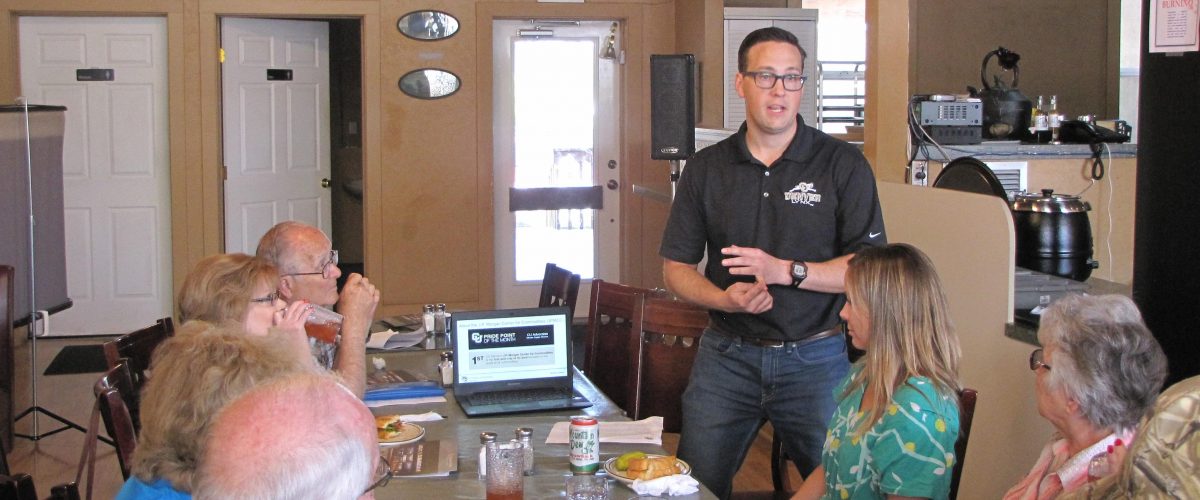
Matt Fleming, Program Manager for the J.P. Morgan Center for Commodities (JPMCC) at the University of Colorado Denver Business School, spoke to about a dozen members of the community at the Colorado City Chamber of Commerce Luncheon on June 9th, held at the Rye Café. Fleming, originally from New York, has an MBA and is working on his MS Finance Degree. The only Center of its kind focusing on commodity education, The JPMCC provides undergraduates a certificate in Commodities, and MBA/MS Finance and Risk Management students the opportunity to specialize in Commodities. Additionally, the JPMCC offers Professional Education programs, which can be found here.
Matt defined a commodity as something that was “tradable and interchangeable”, and there were records of trading as far back as 4000 B.C. in several areas. In 1877, the Chicago Board of Trade was started, which gave trading a home in the United States. Fleming shared that because CU Denver is a business school with no dormitories the majority of the students are in the work force. Fleming also talked about the differences between commodities and stocks and bonds. He shared photos of some of the major companies who act as mentors to the school, and talked about supply and demand. Fleming also introduced Jenny Heit, Project Manager for the corporate Sustainability Program of a company named IHS, Englewood. Heit is a graduate of CU Denver and has an MS degree in Organizational Management.
What led to your invitation to speak? – CU Alum Gordon Kelley, Chairman of the Colorado City Chamber of Commerce contacted me through the CU Advocates network. I was invited to speak on the J.P. Morgan Center for Commodities and general activities of the Business School, with the specific request to focus on areas of interest for rural communities (Colorado City has a population of 2,500).
Why is getting the word out about the school/commodities program important to rural communities? Since much of the state is considered rural, as a state school the University of Colorado needs to reach out and connect with the various communities in Colorado. One of the unique opportunities the JPMCC offers students is the ability to physically visit various commodity sites in the state. Since many of these operations are in rural areas, the JPMCC can help provide a strong link to these often under-represented communities. Additionally, the JPMCC and the Business School offer professional development courses which could be of help to many in the rural community.
What was their reaction to the presentation? My presentation included an overview of the University (all four campuses), the Business School and the Commodities Center. I think everyone was impressed with the achievements of the University and the fact that we are the only school in the nation providing an education in Commodities. Coming from a rural area, all participants were aware of how important agriculture and energy is for their rural economy and the state as a whole, but were really unaware how financial-ized commodities have become once it leaves the farm!
Any takeaways or learnings on your part? Though many people living in rural communities like the tranquility and distance from others, I found they still wanted attention paid to them. I was peppered with questions of how to boost their local economy, how to increase their visibility and what outreach efforts the University makes to rural communities in the area. A main driver of the economy out there is cattle, with its distinguishing factor being organic and hormone-free. They have a great product, but now need to focus on how to get it to the larger markets up north.


